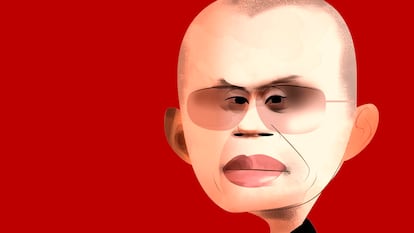Changpeng Zhao, the fall of the last crypto prophet
The resignation of the Binance founder following anti-money laundering charges puts an end to the era of charismatic leaders who staked his future on bitcoin

At the peak of his popularity, Changpeng Zhao’s team devised an efficient system to please his numerous fans and spread his fame. A Binance intern organized a line and asked each person in the line for their cell phone. Then, a company photographer would take the cameras, frame the fan next to Zhao, and shoot again and again, as if on an assembly line. “Can easily get through 300 photos in 15-20 minutes,” Zhao, known as CZ, the initials of his name, explained on the social network X (formerly Twitter). The founder of Binance — the largest cryptocurrency exchange platform in the world — spread his image to the four corners of the planet, which sometimes led to unwanted consequences. “Don’t believe people when they show a selfie and say they are close to CZ or Binance,” CZ said in a post on X, warning against opportunists who sought to take advantage of his fame.
This scene — together with his almost nine million followers on X — gives an idea of the extent to which CZ became a mass idol thanks to his dominance in the crypto sector. But there’s a paradox: CZ is as well known to crypto followers as he is unknown to those outside that universe.
Born in Jiangsu, in China, Zhao, 46, has Canadian nationality. The son of two professors, he lived on the campus of the Hefei University of Science and Technology until August 1989, when at the age of 12 — two months after the massacre of pro-democracy opponents in Tiananmen Square — his parents chose to escape the repression of Chinese authorities. “The line outside the Canadian Embassy was three days long,” Zhao said in an article on the Binance blog, where he reviews his life.
Once in Vancouver, he worked at a McDonald’s and at a service station to help out at home. But a poker game was about to change his destiny. Zhao — a computer engineer from McGill University in Montreal — learns of the existence of a new form of electronic money. After four years working in New York for Bloomberg, in 2005 he moved to Shanghai to create a trading firm. There, he crosses paths with Bobby Lee, then CEO of BTC China — a bitcoin exchange platform in the Asian giant—and investor Ron Cao. In the middle of the card game, they talk to him about cryptocurrencies.
The shock is instantaneous; a near religious revelation. That’s the only way to explain why Zhao — possessed by blind confidence in something that was just beginning — made the drastic decision to sell his house in Shanghai to buy bitcoins. Anyone would have said that it was crazy. But it turned out well. The rise in bitcoin prices would soon earn him a significant sum. Seeing that enormous potential, he sets up Binance.
The company’s growth was exponential. In six months, it became the favorite cryptocurrency exchange platform. “They worked with all possible currencies. They met the demand of many users who were looking to speculate or invest, and they did not take regulatory requirements into account,” explains Javier Pastor, from the Spanish Bit2Me exchange. But once again, the Chinese government was standing in the way: it banned cryptocurrencies and blocked the platform. Binance workers, led by Zhao, leave the country. “The irony that I was once again forced to leave China — approximately 30 years after my parents fled with my sister and I — was not lost on me,” he writes.
They go to Tokyo, then to Malta, and finally avoid talking about where they are based, saying only that their employees work remotely. But the company is registered in the tax haven of the Cayman Islands. Bloomberg includes CZ in its list of 50 most influential people. And at the beginning of 2022, he is the richest man in Canada, with a fortune of $65 billion, putting him close to Mark Zuckerberg.
But the sector’s rosy days are nearing their end. Or, at best, the party has come to a pause. In May 2022, the crypto coin Luna collapses, and months later the FTX platform goes bankrupt. Binance initially considers rescuing the platform, but CZ finally decides against it, not wanting to be dragged down by the company’s chaotic management. Millions of investors lose their savings, and the heads of both firms, Do Kwon from Lula and Sam Bankman-Fried from FTX, end up in prison. Distrust spreads, and there is talk of crypto winter.
For a few months it seemed that CZ could survive the crisis, and even come out stronger. But an investigation in the United States has ended his career. In an agreement with the U.S. Department of Justice, he pleaded guilty to violating anti-money laundering laws, accepted a fine of $50 million and stepped down as CEO of Binance, which will pay a $4.3 billion fine.
It was the fall of the last great crypto prophet. While CZ has been forced to abandon his life’s work, telling his loyal Twitter followers that he won’t be online for a while, his end could have been much worse. He still has shares in Binance, he still has a $15-billion fortune, according to Forbes, and he will not have to wait for lunchtime to stretch his legs in the prison yard.
Sign up for our weekly newsletter to get more English-language news coverage from EL PAÍS USA Edition
Tu suscripción se está usando en otro dispositivo
¿Quieres añadir otro usuario a tu suscripción?
Si continúas leyendo en este dispositivo, no se podrá leer en el otro.
FlechaTu suscripción se está usando en otro dispositivo y solo puedes acceder a EL PAÍS desde un dispositivo a la vez.
Si quieres compartir tu cuenta, cambia tu suscripción a la modalidad Premium, así podrás añadir otro usuario. Cada uno accederá con su propia cuenta de email, lo que os permitirá personalizar vuestra experiencia en EL PAÍS.
¿Tienes una suscripción de empresa? Accede aquí para contratar más cuentas.
En el caso de no saber quién está usando tu cuenta, te recomendamos cambiar tu contraseña aquí.
Si decides continuar compartiendo tu cuenta, este mensaje se mostrará en tu dispositivo y en el de la otra persona que está usando tu cuenta de forma indefinida, afectando a tu experiencia de lectura. Puedes consultar aquí los términos y condiciones de la suscripción digital.









































